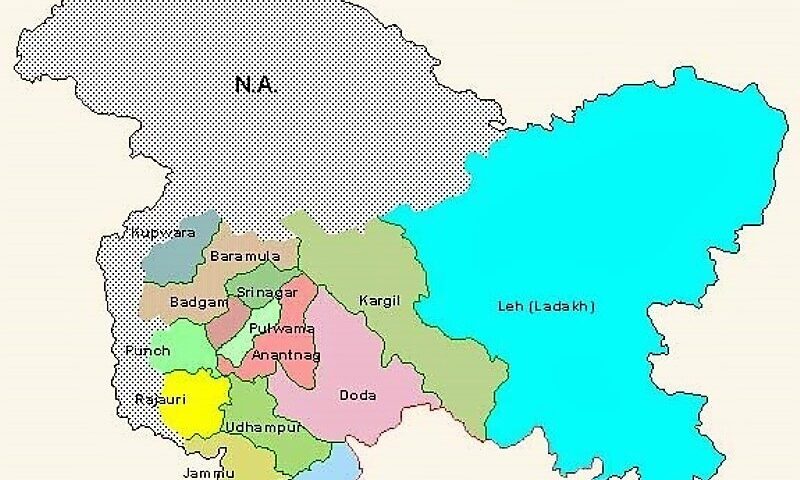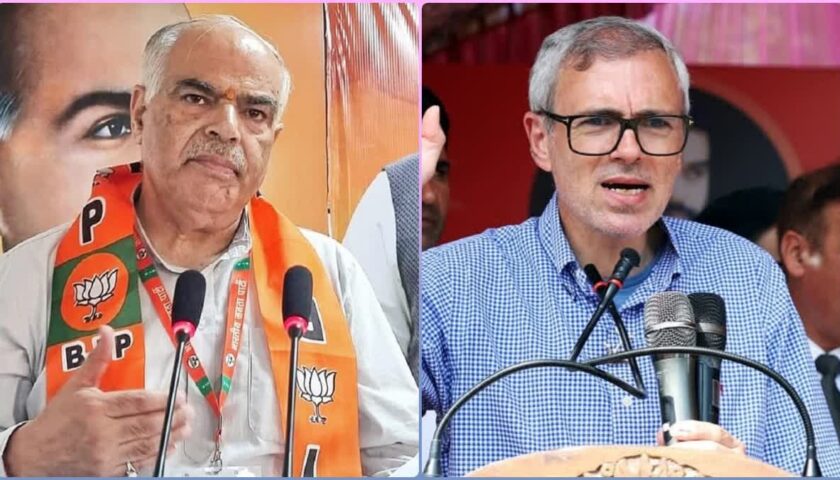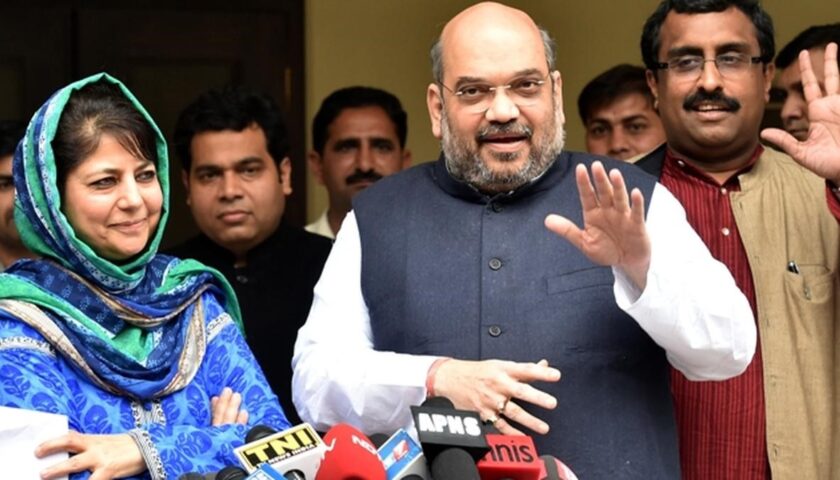Tragedy, Response, and the Perils of Social Media
By: Javid Amin
Srinagar 05 May 2025: The recent terror attack near Pahalgam in South Kashmir, which occurred on April 22nd, and resulted in the tragic deaths of 26 individuals, predominantly tourists, has sent shockwaves throughout the nation. The incident, a brutal act of violence, has not only caused widespread grief but has also ignited a complex and often heated debate about the appropriate response, both in terms of policy and public discourse.
In the aftermath of this tragedy, Himanshi Narwal, the wife of Lieutenant Vinay Narwal, who was among those killed, made a statement urging people not to target Muslims and Kashmiris. Her appeal, born from a place of deep personal loss, was a call for unity and restraint in the face of immense pain. However, her words were met with a barrage of online trolling and criticism across various social media platforms.
This backlash prompted the National Commission for Women (NCW) to step in, issuing a statement condemning the online harassment directed at Himanshi Narwal. The NCW’s intervention highlights a crucial issue in contemporary society: the increasing prevalence of online vitriol, particularly in the wake of tragic events, and the need to balance freedom of expression with the respect and dignity owed to individuals, especially those who are grieving.
This article delves into the complexities of this situation, examining the context of the Pahalgam attack, Himanshi Narwal’s statement, the nature of the online trolling she faced, and the NCW’s response. It also explores the broader implications of this incident for public discourse, social media ethics, and the challenges of navigating grief and tragedy in an increasingly polarized world.
The Pahalgam Attack: A Detailed Look at the Tragedy
The terror attack near Pahalgam was a devastating event that underscored the fragility of peace and the persistent threat of violence in the region. To understand the context of the subsequent reactions and controversies, it is essential to examine the details of the attack itself.
The Location and Its Significance:
Pahalgam, situated in the Anantnag district of Jammu and Kashmir, is a popular tourist destination known for its stunning natural beauty. The area is renowned for its lush meadows, pristine rivers, and snow-capped mountains, attracting visitors from across India and the world. Pahalgam also holds religious significance as it serves as the base camp for the annual Amarnath Yatra, a pilgrimage to the holy Amarnath Cave. The attack’s occurrence in such a prominent location not only amplified its impact but also raised concerns about the safety of tourists in the region.
The Nature of the Attack:
The attack involved militants opening fire on a group of tourists, resulting in the deaths of 26 people. Reports indicate that the militants specifically targeted certain individuals, asking them about their religion before killing them. This element of religious targeting added a particularly disturbing dimension to the tragedy, sparking outrage and condemnation from various quarters. The attack was characterized by its brutality and its targeting of innocent civilians, highlighting the callous disregard for human life that often characterizes acts of terrorism.
The Victims:
The victims of the attack were primarily tourists who had come to Pahalgam to enjoy its natural beauty and participate in recreational activities. Among the deceased was Lieutenant Vinay Narwal, an Army officer. The loss of life included individuals from different parts of India, underscoring the nationwide impact of the tragedy. The targeting of tourists, who are often seen as symbols of peace and normalcy, was a deliberate attempt to disrupt the region’s stability and instill fear.
The Aftermath:
The attack triggered a wave of reactions, including:
- Widespread Condemnation: The attack was condemned by political leaders, religious figures, and civil society organizations across India.
- Increased Security Measures: Security forces in Jammu and Kashmir were put on high alert, and measures were taken to enhance the security of tourist areas.
- National Outrage: The attack sparked national outrage, with many people expressing anger and demanding swift action against the perpetrators.
- Calls for Unity: Amid the grief and anger, there were also calls for unity and restraint, urging people not to allow the attack to divide communities.
The Pahalgam attack was a watershed moment that brought to the forefront the complex challenges facing Jammu and Kashmir, including the persistent threat of terrorism, the need for enhanced security measures, and the importance of maintaining communal harmony.
Himanshi Narwal’s Statement: A Plea for Restraint
In the aftermath of her husband’s tragic death, Himanshi Narwal made a statement that resonated deeply with some but also drew criticism from others. Her words, spoken in the midst of profound grief, were a plea for restraint and a call for unity.
The Content of the Statement:
Himanshi Narwal urged people not to target Muslims and Kashmiris in the wake of the attack. She emphasized that the perpetrators of the violence were terrorists, not representatives of an entire community. Her statement reflected a desire to prevent the tragedy from being used to fuel further division and hatred. She stressed the importance of distinguishing between the actions of a few and the identity of a large population.
The Context of the Statement:
Himanshi Narwal’s statement was made in a context of heightened emotions and widespread grief. The attack had triggered strong reactions across the country, with some individuals and groups expressing anger and directing it towards specific communities. Her intervention was an attempt to counter this narrative and promote a more nuanced and compassionate response. She sought to prevent the targeting of innocent individuals based on their religious or regional identity.
The Significance of the Statement:
Himanshi Narwal’s statement was significant for several reasons:
- A Voice of Reason: In a moment of intense emotional turmoil, she offered a voice of reason and calm, urging people to resist the urge to generalize and scapegoat.
- A Call for Unity: Her words were a call for unity, emphasizing the shared humanity of all people and the need to stand together against violence and hatred.
- A Challenge to Divisive Narratives: She challenged divisive narratives that seek to pit communities against each other, highlighting the dangers of such rhetoric.
- A Personal Perspective: Her statement was particularly powerful because it came from someone who had suffered a great personal loss, lending it a unique weight and authenticity.
Himanshi Narwal’s statement was a courageous act that demonstrated her strength of character and her commitment to peace and understanding. It served as a reminder that even in the face of tragedy, it is possible to choose compassion over anger and unity over division.
The Online Trolling: A Descent into Vitriol
Unfortunately, Himanshi Narwal’s appeal for restraint was met with a wave of online trolling and harassment. This vitriol highlights a disturbing trend in contemporary society: the increasing prevalence of online abuse, particularly in the wake of tragic events.
The Nature of the Trolling:
The online trolling directed at Himanshi Narwal took various forms, including:
- Personal Attacks: Many individuals resorted to personal attacks, questioning her motives, her character, and even her patriotism.
- Hateful Language: Some posts contained hateful language, using derogatory terms and making inflammatory statements about Muslims and Kashmiris.
- Religious and Regional Slurs: She was targeted with religious and regional slurs, reflecting a deep-seated prejudice and intolerance.
- Character Assassination: There were attempts to assassinate her character, spreading false rumors and making baseless accusations.
- Threats and Intimidation: In some cases, the trolling escalated into threats and intimidation, creating a hostile and unsafe online environment.
The Reasons for the Trolling:
The reasons behind the online trolling are complex and multifaceted, including:
- Disagreement with Her Views: Some individuals disagreed with Himanshi Narwal’s views, believing that her statement was inappropriate or misguided.
- Emotional Outrage: The attack had triggered strong emotions, and some people expressed their outrage in a destructive and harmful way.
- Prejudice and Intolerance: The trolling also reflected underlying prejudices and intolerance towards Muslims and Kashmiris, which were brought to the surface by the tragedy.
- Anonymity and Impunity: The anonymity and perceived impunity of the online world emboldened some individuals to engage in abusive behavior.
- Political Agendas: In some cases, the trolling may have been fueled by political agendas, with individuals or groups seeking to exploit the tragedy for their own purposes.
The Impact of the Trolling:
The online trolling had a significant impact on Himanshi Narwal, causing her:
- Emotional Distress: The barrage of abuse caused her immense emotional distress, adding to the pain of her recent loss.
- Psychological Trauma: The hateful and threatening nature of the trolling could have long-lasting psychological effects.
- Fear and Insecurity: She may have felt fear and insecurity, knowing that she was being targeted by a large number of hostile individuals.
- Loss of Privacy: The trolling may have led to a loss of privacy, with personal information being shared or discussed online.
- Chilling Effect: The trolling could have a chilling effect on others who might want to speak out in favor of peace and unity, discouraging them from expressing their views.
The online trolling of Himanshi Narwal was a deplorable act that demonstrated the dark side of social media and the urgent need for greater responsibility and ethical behavior in the online world.
NCW’s Intervention: A Stand for Dignity and Respect
In response to the online trolling of Himanshi Narwal, the National Commission for Women (NCW) stepped in, issuing a statement condemning the harassment and extending its support to the grieving widow.
The Role of the NCW:
The NCW is a statutory body established by the Government of India to address the issues concerning the welfare of women. Its mandate includes:
- Investigating Complaints: Investigating complaints of discrimination, harassment, and other forms of violence against women.
- Making Recommendations: Making recommendations to the government for the improvement of the status of women.
- Promoting Awareness: Promoting awareness of women’s rights and issues.
- Providing Support: Providing support and assistance to women in distress.
The NCW’s intervention in the case of Himanshi Narwal falls squarely within its mandate to protect the dignity and rights of women.
The Content of the NCW Statement:
The NCW statement:
- Condemned the Trolling: It explicitly condemned the online trolling directed at Himanshi Narwal, stating that it was “unfortunate.”
- Acknowledged Her Grief: It acknowledged the fact that Himanshi Narwal was grieving the loss of her husband, emphasizing the sensitivity of the situation.
- Defended Her Right to Expression: It defended her right to express her views, even if those views were controversial or unpopular.
- Called for Restraint: It called for restraint in criticizing her, urging people to express their disagreement within “constitutional limits” and through “civil discourse.”
- Emphasized Women’s Dignity: It reminded citizens that “the dignity and respect of every woman is valuable” and should be upheld.
- Advocated for Respectful Discourse: It called for “constructive and respectful expressions” even during times of national grief.
The Significance of the NCW’s Stance:
The NCW’s stance in this matter is significant for several reasons:
- A Defense of Women’s Rights: It is a strong defense of women’s right to freedom of expression, even when their views are unpopular or controversial.
- A Condemnation of Online Abuse: It sends a clear message that online abuse and harassment will not be tolerated, especially when directed at women.
- A Call for Empathy: It is a call for empathy and compassion, urging people to be sensitive to the pain and suffering of others.
- A Reminder of Ethical Conduct: It serves as a reminder of the importance of ethical conduct in public discourse, both online and offline.
- A Support for the Vulnerable: It provides support and solidarity to a woman who is in a vulnerable position, having recently lost her husband in a tragic event.
The NCW’s intervention is a welcome step that demonstrates its commitment to protecting women’s rights and promoting a more just and equitable society.
The Broader Implications: Navigating Grief and Discourse in a Polarized World
The incident involving Himanshi Narwal and the subsequent online trolling raises several broader implications for how we navigate grief, tragedy, and public discourse in an increasingly polarized world.
1. The Challenges of Grief in the Public Eye:
In the age of social media, personal grief is often thrust into the public sphere. Individuals who have suffered a loss may feel compelled to share their feelings online, seeking support and connection. However, this can also expose them to criticism and scrutiny, as their words are dissected and judged by a vast and often anonymous audience. The case of Himanshi Narwal highlights the challenges of grieving in the public eye, where personal pain can become a subject of public debate.
2. The Erosion of Civil Discourse:
The online trolling directed at Himanshi Narwal is a symptom of a broader problem: the erosion of civil discourse. Online platforms often foster an environment of hostility and aggression, where disagreements quickly escalate into personal attacks and hateful speech. This trend is particularly concerning in the wake of tragic events, when the need for empathy and understanding is greatest. The incident underscores the urgent need to promote more respectful and constructive forms of communication.
3. The Dangers of Identity-Based Generalizations:
The tendency to target entire communities based on the actions of a few is a dangerous and destructive phenomenon. The Pahalgam attack, perpetrated by terrorists, should not be used to justify prejudice or discrimination against Muslims or Kashmiris. Himanshi Narwal’s statement was a powerful reminder of this, and the online trolling she faced highlights the persistence of this harmful tendency. The incident underscores the importance of challenging identity-based generalizations and promoting a more nuanced and accurate understanding of complex issues.
4. The Responsibility of Social Media Platforms:
Social media platforms play a significant role in shaping public discourse. The trolling of Himanshi Narwal raises questions about the responsibility of these platforms to address online abuse and harassment. While freedom of expression is a fundamental right, it should not come at the expense of the safety and dignity of individuals. Social media companies need to develop more effective mechanisms for preventing and responding to online abuse, including stricter enforcement of community standards and better tools for reporting and blocking harassment.
5. The Need for Empathy and Compassion:
Ultimately, the incident involving Himanshi Narwal is a reminder of the importance of empathy and compassion. In the face of tragedy, it is crucial to respond with kindness and understanding, rather than anger and hatred. This is particularly true when dealing with individuals who are grieving, as they are in a vulnerable state and in need of support. The incident underscores the need for a more humane and compassionate approach to public discourse, one that prioritizes the well-being of individuals and the promotion of social harmony.
Conclusion: A Call for Responsibility and Respect
The case of Himanshi Narwal and the online trolling she endured is a stark reminder of the challenges we face in navigating grief, tragedy, and public discourse in an increasingly polarized world. The Pahalgam attack was a horrific act of violence that caused immense pain and suffering. Himanshi Narwal’s response, a plea for restraint and unity, was a courageous act that deserved respect and understanding. The online trolling she faced was a deplorable act that highlighted the dark side of social media and the urgent need for greater responsibility and ethical conduct in the online world.
The NCW’s intervention in this matter is a welcome step that demonstrates its commitment to protecting women’s rights and promoting a more just and equitable society. It is a call for empathy, compassion, and respect, urging us to treat each other with dignity, even in the midst of disagreement and grief.
As we move forward, it is essential to learn from this incident and to strive for a more humane and responsible approach to public discourse. We must:
- Uphold Freedom of Expression: Protect the right of individuals to express their views, even when those views are unpopular or controversial.
- Condemn Online Abuse: Take a firm stand against online abuse and harassment, holding perpetrators accountable for their actions.
- Promote Civil Discourse: Foster a culture of respectful and constructive communication, both online and offline.
- Challenge Prejudice: Actively challenge prejudice and discrimination in all its forms, promoting understanding and tolerance.
- Support the Vulnerable: Provide support and assistance to those who are in vulnerable positions, such as those who are grieving or who have been targeted by violence.
- Demand Accountability from Social Media Platforms: Hold social media companies accountable for addressing online abuse and harassment, and for creating a safer and more ethical online environment.
By embracing these principles, we can honor the memory of the victims of the Pahalgam attack, support those who are grieving, and work towards building a more just, compassionate, and harmonious society.




